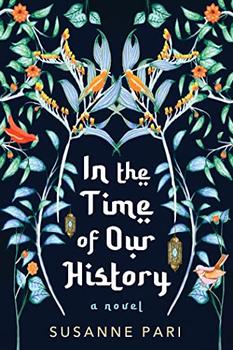Summary | Excerpt | Reading Guide | Reviews | Beyond the Book | Readalikes | Genres & Themes | Author Bio

On the main road, the school bus flashed its lights and slowed to take on a group of children. Yusef peeked into the rearview mirror and chuckled at the teenager's angry contortions. When he looked back at the bus, a glint of pink caught his eye: a shiny backpack, the likes of which he remembered well, on the back of a little girl with dark silky hair so familiar to him that he could feel the strands slipping like bird's feathers through his fingers. His throat constricted. He would never again experience that. This was how the ghosts of his lost grandchildren came to him—suddenly. An ambush, an attack, a weakening of his bladder. A gasp filled his chest. And then the life of his precious Anahita unfolded before him ... the tiny baby who gripped his finger for however long he held her, the chubby toddler who crawled into his lap to feed him a rice cookie, the girl whose delicate feet walked on his back, whose dark eyes gleamed when he came home at the end of the day, the woman who never challenged him, always respected him, and who gave him those beautiful grandchildren.
The school bus extinguished its red light, and a plume of gray exhaust ballooned from its tailpipe. Yusef pulled the Jag onto the narrow shoulder. He didn't notice the triumphant fist of the tormented teenager thrust like a periscope above the car as it passed. His eyes were fixed on the back window of the school bus, looking for another glimpse of pink.
The spell began to pass in less than a minute, which was as long as it took him to dial his office. "Any messages?" he demanded when his secretary answered.
"Good morning, Mr. J."
He sighed. Vivian would not give him his messages until he returned her greeting. It was impertinent, but she'd been with him for thirty years; more important, she had the sharp mind and quick skills of a master bookkeeper but required only the salary of—what did they call it these days?—an administrative assistant.
"Good morning, Vivian," said Yusef. "Any messages?"
"No messages, Mr. J."
"Did you track down those punk painters?"
"No such address, Mr. J. The phone number's wrong too. It's a pizza place in the Bronx."
He slapped the steering wheel with his palm. "I will be there in fifteen minutes." He hung up, peered into the side mirror, and peeled out, raising a cloud of gravel. He was himself again.
* * *
As far back as anyone remembered, the Jahani patriarchs were landowners. Khans, they were called, gentry. Even after the Shah's White Revolution in the 1960s when massive plots of private land were distributed to the tenants of these khans, the Jahanis continued to profit from land-related projects. And now, in America, it was the same, though not as filthy lucrative as it had been in Iran. Over the years, Yusef had slowly bought up land with an intuition for how the suburbs would grow and sprawl, and with an imagination that saw housing tracts, apartment buildings, and strip malls where forests and dairy farms had once been.
Yusef pulled into his usual parking space and hung his illegally procured handicapped tag from the rearview mirror. The Jahani family offices occupied the fourth and top floor of a stucco building fashioned in a faux Mediterranean style—teal-colored trim, arched portico, and pathways of tessellated pavers. The building was flanked by two twenty-story 1960s brick apartment houses, their air-conditioning units sticking out like tongues dripping saliva. Yusef rather liked the apartment houses, had in fact considered purchasing them, evicting their fixed-income widows and bubblegum-chewing single mothers, and converting the units into condominiums. But Nezam, his sister-in-law's son, who now took care of the legal department, talked him out of it. "It's not worth the hassle with the city or the bad publicity," he'd said. "Besides, the buildings are ugly, Uncle." This new male generation, Yusef thought, with its power-bar lunches, vibrating pocket gadgets, and diaper-changing skills, had no sense of architectural aesthetics. Sourly, he recalled how he'd allowed Nezam and the others to persuade him on the Mediterranean design of this, his own building, when he'd wanted to erect an elegant glass rectangle evocative of the Hancock Building in Boston. It had been one of his weak moments.
Excerpted from In the Time of Our History by Susanne Pari. Copyright © 2023 by Susanne Pari. Excerpted by permission of Kensington Publishing. All rights reserved. No part of this excerpt may be reproduced or reprinted without permission in writing from the publisher.
Your guide toexceptional books
BookBrowse seeks out and recommends the best in contemporary fiction and nonfiction—books that not only engage and entertain but also deepen our understanding of ourselves and the world around us.